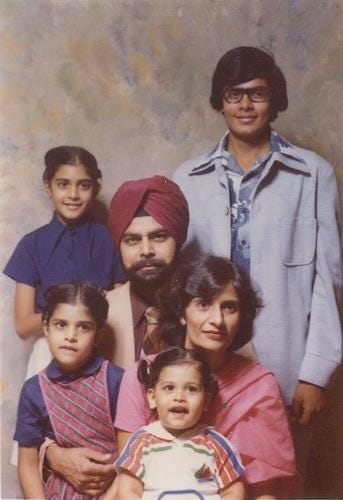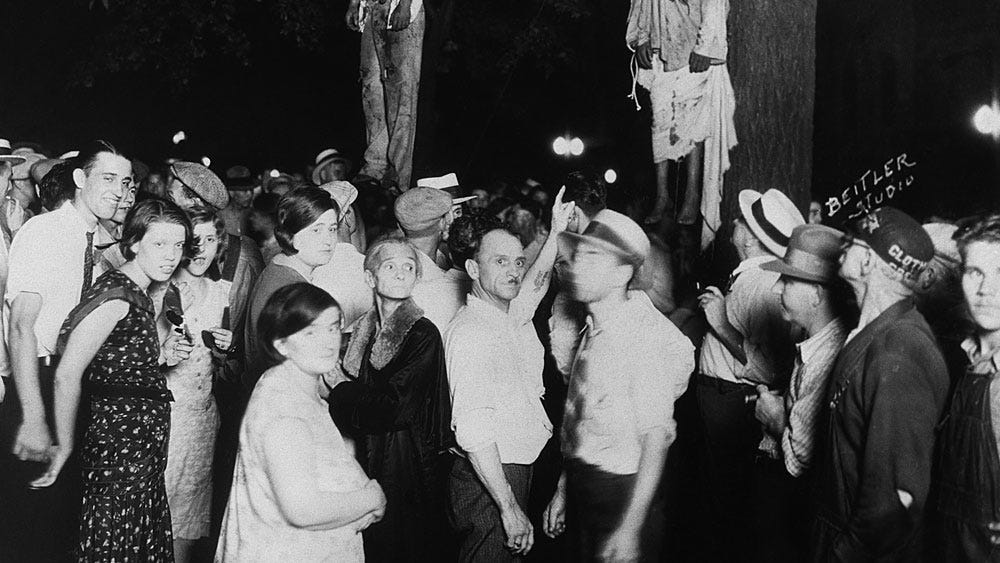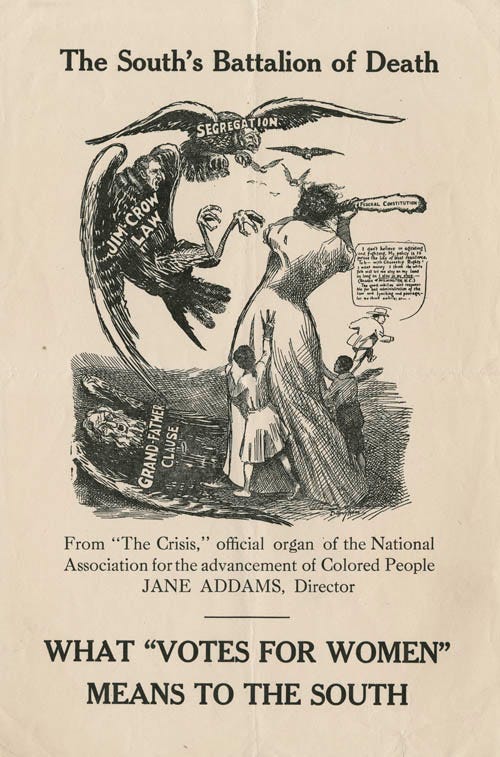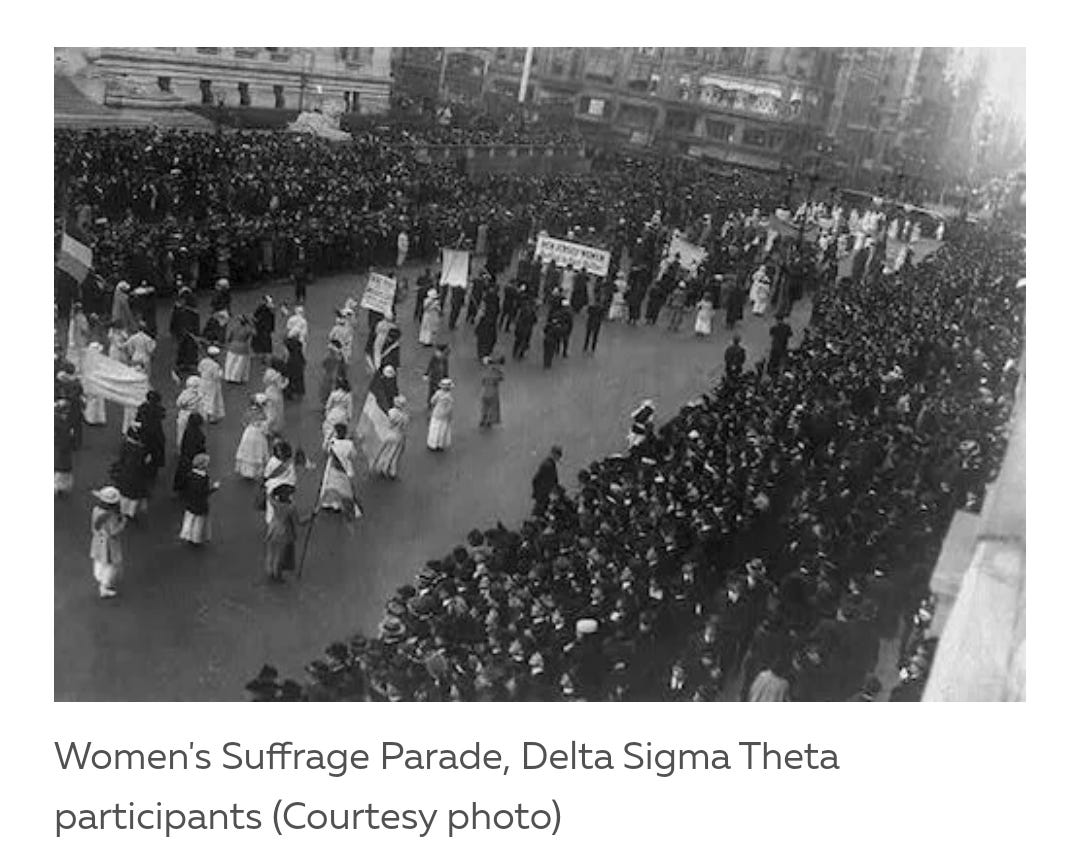Black History Makers: Mary Church Terrell, Delta Sigma Theta, and the fight for women's suffrage
Get the Point!
While former South Carolina Gov. Nikki Haley is vying to become the first woman to lead a Republican presidential ticket in her race against former President Donald Trump, in so doing, she—like Trump and just about every single popular Republican politician—has shown a disturbing knack for denying the ghosts of racism past and present while stumping for MAGA votes across the United States.
What makes Haley's insistence that the U.S. has “never been a racist country” suspect is that she has often recounted her own brushes with racism as a “brown skinned girl” born in 1972—but has changed her narrative to please a horrifically ignorant base, one that’s filled with aggressive racists (or racism deniers) who support (or take no issue with) racist political policies.
Nimarata “Nikki” Randawha Haley (in jumper) and family circa 1975
What makes Haley’s position even more suspect is that a little over a century ago, but for the efforts of Black women like Mary Church Terrell and her brave Delta Sigma Theta Sorority Sisters, she wouldn't be able to vote—let alone run—for the Republican presidential nomination!
Mary Church Terrell, famous civil rights leader
From our earliest American history lessons in grade school, many of us were taught to revere women like Susan B. Anthony, Lucretia Mott and Elizabeth Cady Stanton for their efforts in pushing for women’s suffrage, but what often went unmentioned were the roles that Black women like Sojourner Truth, Mary Church Terrell, and Ida B. Wells played in fighting for women’s voting rights, all the while fighting white supremacy—even from some white women’s suffragists—as well!
By 1896, only 30 years removed from slavery, Mary Church Terrell was the renowned leader of the National Association of Colored Women. The organization’s primary aim was to rectify one obvious weakness of the 15th Amendment, which was voting discrimination based on gender. During this same period, noted journalist and anti-lynching crusader Ida B. Wells recognized that access to the ballot box could be key in stopping southern trees from bearing “Strange Fruit,” a scourge that was sweeping not only the south, but also the Midwest. To that end, Wells helped found the Alpha Voting Group and pushed for women’s suffrage across the Upper South and into Illinois.
The collective early works of white and Black women’s suffragists met some success, with Wyoming granting women the right to vote in 1890. Wyoming was soon followed by Colorado, Utah, Idaho, Washington, California, Arizona, Kansas, Oregon, Montana, Nevada, New York, Michigan, Oklahoma, and South Dakota–each granting white women the right to vote before 1918.
But despite these successes, white women within the suffrage movement were hesitant to fully join forces with Black women; one reason for their reticence was the fear that if a national women’s suffrage measure passed in Congress, that southern states would never ratify it due to the Jim Crow laws in Dixie that relegated all Blacks to second class citizenship.
A second (and far more facile) explanation is that some white women simply were just as racist as their husbands and while interested in elevating themselves to equal status with white males, they harbored no such desires to be equal with Black women—or men!
White women were frequent participants in the lynching of Black men, women, and children across the south and midwest during the 20th Century…
The proof in this last assertion, racism being exhibited by white women’s suffragists, was found in the fact that some sided with southern segregationists who argued that by allowing white women the right to vote, that the same could offset Black male voting power should the federal courts invalidate the poll taxes, literacy tests, and other “legal” voting impediments that southern legislatures adopted to dilute the 15th Amendment during the 1880’s and 90’s. Alas, those voting impediments were validated in the U.S. Supreme Court’s 1896 Plessy vs. Ferguson decision, a major victory for racists that provided a temporary victory for sexists as well with respect to women's voting rights.
A handbill from “The Crisis” magazine pushing for the 19th Amendment…
In early 1913, white organizers were so afraid of southern obstruction of women’s suffrage that when a determined group of 22 Black women from the newly founded Delta Sigma Theta Sorority sought inclusion in a planned march in Washington, D. C., they were granted permission to march but under one condition—that they form up not in the vanguard—but in the very back of the lines!
Undaunted, the Deltas marched proudly and boldly forward, showing little to no fear of being attacked by the vocal white male counter protesters along the parade route.
In the years that followed, the outbreak of World War I placed women’s suffrage somewhat on the national back burner, but the fact that women answered their nation’s call to assist in the war effort by working in munitions and supply factories, ultimately weakened the age-old argument that women were the “weaker” sex and should not be eligible to vote. The American domestic war effort was particularly aided by a number of Black women who migrated from the south to Chicago, Detroit, and other urban areas to help with the war effort in those factories—all the while earning relatively high wages that helped develop a Black Middle Class that would last throughout much of the 20th Century.
My mother, Vivian Hobbs, aunt Lenora Hobbs Cambridge, and cousin Andrea Cambridge Rasul remain proud of the legacy of service as exhibited by the Founders of their Sorority, Delta Sigma Theta…
When World War I ended, the push for women's voting rights began anew and the 19th Amendment was ratified on August 18, 1920, thus, providing women—white women at least—access to the ballot. While some Black women were able to vote in areas where Jim Crow laws were not as rigid, it would take another 45 years—and the passage of the Voting Rights Act in 1965—before all Blacks people and women of color, like Gov. Haley's family, were finally given full fledged voting rights in the United States.
Lest we forget…











That is a very sweet picture of your mom, your aunt, and your cousin.